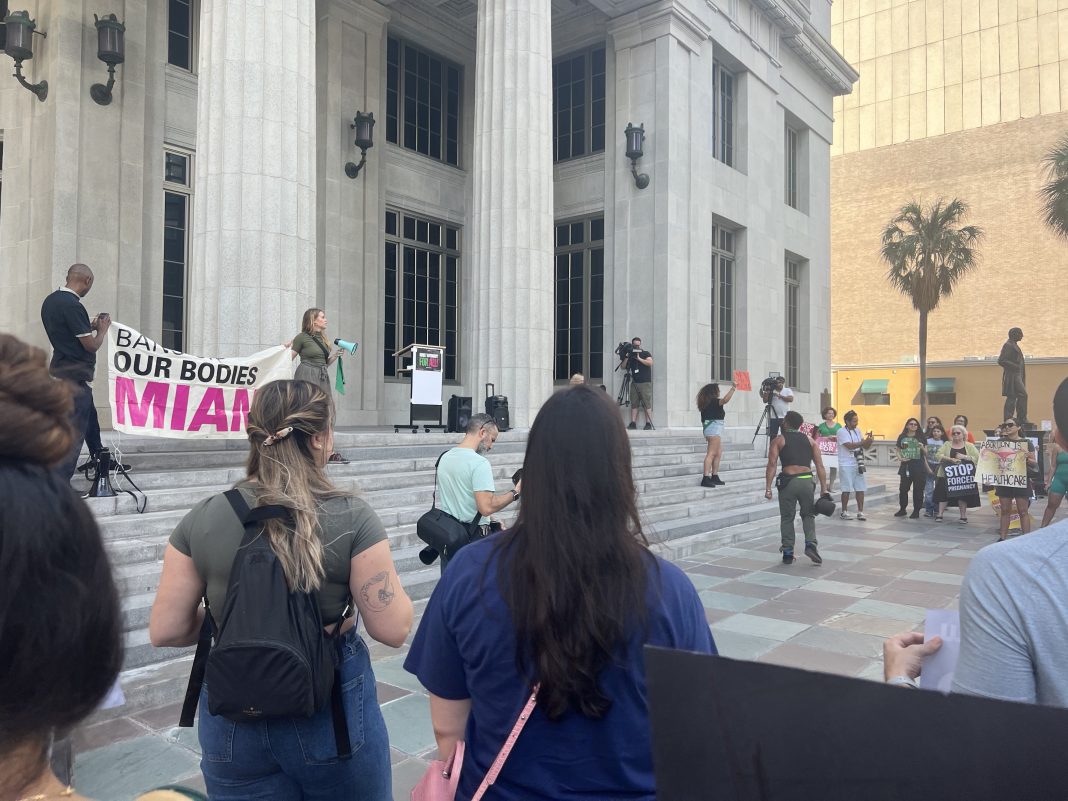
On what would have been the 50th anniversary of Roe v. Wade, the historic case that granted the right to abortion in the U.S, there was instead a day of protest as pro-choice groups mobilized across the country.
In Miami, the local Women’s March chapter, alongside other grassroot programs, organized a rally outside the Miami-Dade County (MDC) courthouse where a couple hundred supporters gathered throughout the day. The protestors spanned generations, ranging from women who had protested in the 1970s prior to the 1973 Roe v. Wade decision, to the new wave of young feminists.
“We are the people that are going to be affected in the long run. We are the generation that is coming up and all these laws that are being placed are effecting us directly,” said Nathalie Saladrigas, a leader of the Florida Student Power Network who spoke at the event.
Dressed in green, the color of the global abortion rights movement, the demonstrators chanted against current Florida Governor Ron DeSantis and listened to speeches from leaders in the community working to preserve abortion access.
“We need people to stay angry so that they can know that they have the power to make change,” said Kat Duesterhaus, the organizer of the Bigger Than Roe protest.
Florida is a prominent state for providing abortion access to the southern United States, where many states have implemented strict or total abortion bans after the overturning of Roe v. Wade. This has led to hundreds of patients traveling to Florida seeking abortions. The Florida Agency for Health Care Administration reported 5,439 out-of-state abortions performed at the start of December 2022, 500 cases over the 4,900 reported in 2021.
Current policy in Florida. restricts abortions after 15 weeks of pregnancy with exceptions if the pregnancy endangers the life of the woman but not for rape or incest. Carrie Feit, a lawyer and Women’s March captain for the Miami-Dade area, expects that these policies will be further restricted as Republican state senate leaders call for six and 12 week bans.
“We know that anything from a 12 week to a total ban is coming. We also expect further restrictions around the abortion pill and we expect criminalization around assisting folks with getting an abortion and even out-of-state abortions,” Feit said in her address to the crowd.
The saving grace for pro-choice supporters is the cementation of the right to abortion in the Florida constitution, Section 23, through an expressed privacy clause, which unlike in the United States constitution is explicitly stated. This provides those in the state with an extra layer of security against further restrictions.
Feit believes that even if future legislation creates stricter bans, it will face pushback in the courts over this privacy clause. To align with potential new legislation, the Florida state courts would need to change the precedent on this clause’s constitutional interpretation.
“Any further ban will end up in the courts and now the worst part is that the courts may very well overturn that state constitutional right,” Feit said. “They may interpret it that it doesn’t apply to abortion even though in the past they have said it does apply.”
The current 15 week ban has just been approved to be seen before the Florida Supreme Court.
Noting the importance of Florida in the fight to protect abortion access, U.S. Vice President Kamala Harris traveled to Tallahassee, Fla. where she spoke to a crowd of over a thousand supporters.
“Can we truly be free if so-called leaders claim to be ‘on the vanguard of freedom’ while they dare to restrict the rights of the American people and attack the very foundations of freedom?” Harris said in her address.
Giving her speech just miles from the Florida State Capitol Building, Harris challenged DeSantis’ wobbling stance on further abortion restriction and the threats from Florida Senate to harden abortion policy.
“I think this shows the dire state that we are in in regard to abortion rights,” Heit said.“She came because it is important for people to see that. ‘Wow, Kamala’s here. We better get working.”
Duesterhaus recognizes the need to stay active and emphasizes the destructive impact these bans can have on the youth seeking education in particular.
“I think it’s really important because when you’re dedicating your time and your energy to studying and bettering yourself and to learn a trade or career or how you make a difference in the world, the right to have abortion healthcare can allow you to keep that, keep your trajectory. But if you’re forced to give birth, in the middle of your study, it’s a crime against education,” Duesterhaus said.






